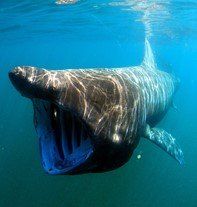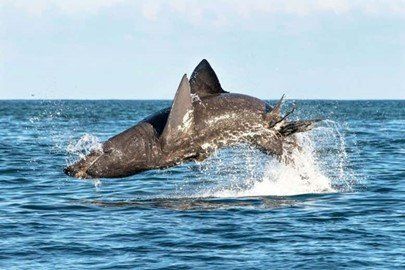FANTASTIC BREACHES AND WHERE TO FIND THEM!
Sophie A. Maycock | 14th of October 2020.
The basking shark is arguably one of the more bizarre-looking amongst the commonly recognised shark species. Their enormous size (up to 12m) and huge gaping mouth (reaching almost1m across) may make these sharks appear intimidating, but in fact, they are completely harmless to humans.
You may be surprised to learn that basking sharks are commonly sighted in the Irish sea, especially during the spring, at hotspots along the south coast from Cork to Kerry and on the west coast at Mayo, Sligo and Donegal. In fact, it seems their numbers may be increasing in the area!
Despite adults weighing over 5,000kg, basking sharks are known to “
breach ”, meaning they jump out of the surface of the water. In fact, they often breach several times in a row… Quite a sight! This behaviour can also be seen in white sharks (Carcharodon carcharias ), short-fin makos (Isurus oxyrinchus) and common thresher sharks (Alopias vulpinus). However, unlike these species, basking sharks do not require surprise attacks with great bursts of speed in order to catch their prey. In fact, they usually cruise at a leisurely 3 km per hour. With their mouth open, 500 tons of water per hour are filtered through their “
gill
rakers ” (small cartilaginous projections from the gill arch, which forma finger-like sieve) to sift out “
zooplankton ” (tiny animals such as crustaceans, and eggs and larvae of larger animals), on which they feed (Compagno, 1984).
So why do these sharks jump?
It has been suggested that basking sharks may use breaching to communicate with “
conspecifics ” (other members of the same species). Communication between animals involves sending a signal, or “
cue ”,which can be detected by a conspecific or a “
heterospecific ” (individual of a different species). These cues can take many forms, including visual signals (like dancing), chemical attractants/ deterrents (like “
pheromones ”)or auditory signals (such as singing or roaring). A cue may say, “I am bigger than you, back away from my food” or “I am a healthy, sexy male, we should have babies”. Sharks have all 5 senses that humans can relate to (sight, hearing, touch, taste, smell), but also have 2 other senses through which they can receive cues! Sharks are able to detect electromagnetism through the “
Ampullaeof Lorenzini ” (jelly-filled organs in their snout) and are able to detect movement of water and changing pressure through their “
lateral line ” (a short range mechano sensory structure which runs along the centre-line on both sides of the body from nose to tail (you can see this organ if you look on each side of any fish you have in a home aquarium!)).
The action of jumping and landing back on the surface of the water creates a large splash, which sharks could detect by sight, sound, or water movement. Displacing a large amount of water with a breach could communicate size to conspecifics through visual cues (a large splash), auditory cues (a loud sound as the shark hits the water) or water displacement (movement of water particles caused by the shark landing). This could be useful for communicating in both foraging and courtship contexts (Rudd, 2020).
It is also possible that basking sharks use breaching for the maintenance of their health. Spinner dolphins (Stenella longirostris) are known to use breaching to dislodge parasites for this purpose. Basking sharks are plagued by lampreys (a jawed fish with a toothed, sucking mouth, which bore into flesh to suck blood) and it is possible breaching could rid them of these parasites, as the force of their bodies against the surface would knock them off (Rudd, 2020).
In truth, we have more work to do to be certain of the function of breaching. It is very possible that the behaviour has several functions depending on the context; for competition during foraging and for signalling during courtship and also to remove parasites, for example.
In British waters, if luck is on your side and you know where to go, you can witness these spectacular breaches in person! Recent research is focusing on an area in the Sea of Hebrides, off the coast of the islands of Coll and Tiree. This site is now a proposed Marine Protected Area (MPA).If this bid is successful, it would mean that human activity within the MPA would be restricted, including potentially limiting fishing (banning fishing in certain sites or during certain seasons or implementing catch limits) and controlling boat moorings, in order to protect marine life from disruption. If basking sharks are breaching during competitive foraging, this would suggest that this area is important for their diet. On the other hand, if they breach during courtship displays, this would suggest the area may act as a mating site(Rudd, 2020). As basking sharks are currently classified as “
Endangered ”by the International Union for Conservation of Nature (meaning their numbers are declining globally) (IUCN, 2018), protection of basking sharks’ critical habitats will be vital to ensure their survival for future generations to enjoy!
If you would like to see a basking filmed off the south coast of Ireland, head over to ORCA IRELAND's YOUTUBE CHANNEL and hit SUBSCRIBE to support us making more videos during our important research.
References:
Compagno
, L.J. V. ( 1984
).
"CETORHINIDAE – Basking sharks". In: Sharks of the
World: An annotated and illustrated catalogue of shark species known to date.
Food and Agriculture Organization of the United Nations.
IUCN
( 2018
). https://www.iucnredlist.org/species/4292/48953216
.
Accessed: 15.06.2020, 12:30h.
Rudd, J.L.
( 2020
). ‘Fantastic breaches and where to find them:
first insights into basking shark breaching behaviour’. In: The role of
accelerometry in the conservation of two coastal marine vertebrates
.
Masters degree thesis, University of Exeter, Exeter, UK, pp. 24- 58.

















